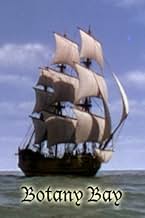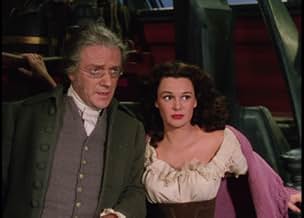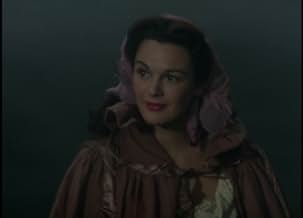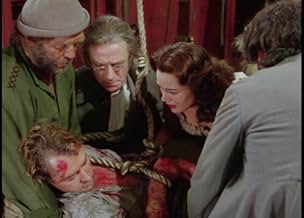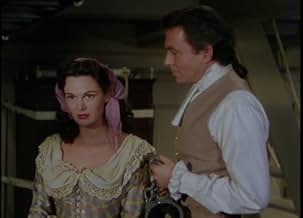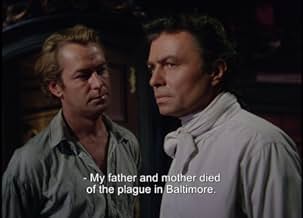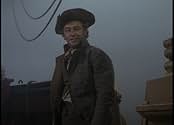1787 अमेरिकी मेडिकल छात्र ह्यूग टालेंट और ब्रिटिश दोषियों को दुष्ट कप्तान गिल्बर्ट की कमान वाले जहाज पर लंदन से न्यू साउथ वेल्स भेजा गया था.1787 अमेरिकी मेडिकल छात्र ह्यूग टालेंट और ब्रिटिश दोषियों को दुष्ट कप्तान गिल्बर्ट की कमान वाले जहाज पर लंदन से न्यू साउथ वेल्स भेजा गया था.1787 अमेरिकी मेडिकल छात्र ह्यूग टालेंट और ब्रिटिश दोषियों को दुष्ट कप्तान गिल्बर्ट की कमान वाले जहाज पर लंदन से न्यू साउथ वेल्स भेजा गया था.
- निर्देशक
- लेखक
- स्टार
Cedric Hardwicke
- Gov. Phillips
- (as Sir Cedric Hardwicke)
Anita Sharp-Bolster
- Moll Cudlip
- (as Anita Bolster)
Brandon Toomey
- Guard
- (as Brendan Toomey)
Patrick Aherne
- Bo's'n's Mate
- (बिना क्रेडिट के)
John Albright
- Sailor
- (बिना क्रेडिट के)
Walter Bacon
- Prisoner
- (बिना क्रेडिट के)
फ़ीचर्ड समीक्षाएं
I recall catching this as a kid on local TV, a screening which, most probably, came about via the personal print of the film-buff sexton who calls over a number of friends, me included, from time to time to his private home theater in order to share in his vast movie collection on 16 and 35mm. Based on a book by the authors behind "Mutiny On The Bounty", this follows a very similar path with a ship's crew at the mercy of a martinet captain (James Mason basically returning to the kind of role which had made him a star in his homeland); his opposition is led by medical student(!) Alan Ladd (typically dour) who's actually one of the many prisoners bound for exile in far-away Australia, among whom is also leading lady Patricia Medina (predictably, over the course of the film, she also becomes a personal object of contention between the two male stars).
Despite such imposing credentials as scriptwriter Jonathan Latimer and director Farrow, the film perhaps fails to rise consistently above the routine not even with such unusual plot points as Mason's adoption of a banned form of punishment (keel-hauling); during the latter stages, then as the company sets ashore, and we also get to meet Governor Sir Cedric Hardwicke the film tends to lose the initial momentum of the ship-board brutality. Suffice it to say that the film I watched just prior to it, CARTOUCHE (1962; with Jean-Paul Belmondo and Claudia Cardinale) was over 20 minutes longer but seemed to me to have moved at a much quicker pace! Even so, BOTANY BAY remains a good example of the colorful entertainment they used to churn out in the old days, given an extra edge by Mason's compelling portrayal (which, if anything, suggests that he'd have made a marvelous Captain Bligh).
For the record, John Farrow directed Alan Ladd for the fifth and last time here after what looks like a run of mostly unassuming action potboilers: CHINA (1943), the equally seafaring TWO YEARS BEFORE THE MAST (1946), CALCUTTA (1947) and BEYOND GLORY (1948). It must be said here that, locally, Alan Ladd was a very popular film star with my father's generation and, apart from the immortal Western SHANE (1953), it's a pity that he seems to have been undeservedly forgotten with the passage of time.
P.S. Useless bit of trivia: I have just come across an allegedly uncut copy of the controversial WAKE IN FRIGHT aka OUTBACK (1971; with Donald Pleasence) taken from an Australian TV screening and, as the credits rolled, an announcer informs the audience to tune in at the same time tomorrow for a screening of BOTANY BAY!!
Despite such imposing credentials as scriptwriter Jonathan Latimer and director Farrow, the film perhaps fails to rise consistently above the routine not even with such unusual plot points as Mason's adoption of a banned form of punishment (keel-hauling); during the latter stages, then as the company sets ashore, and we also get to meet Governor Sir Cedric Hardwicke the film tends to lose the initial momentum of the ship-board brutality. Suffice it to say that the film I watched just prior to it, CARTOUCHE (1962; with Jean-Paul Belmondo and Claudia Cardinale) was over 20 minutes longer but seemed to me to have moved at a much quicker pace! Even so, BOTANY BAY remains a good example of the colorful entertainment they used to churn out in the old days, given an extra edge by Mason's compelling portrayal (which, if anything, suggests that he'd have made a marvelous Captain Bligh).
For the record, John Farrow directed Alan Ladd for the fifth and last time here after what looks like a run of mostly unassuming action potboilers: CHINA (1943), the equally seafaring TWO YEARS BEFORE THE MAST (1946), CALCUTTA (1947) and BEYOND GLORY (1948). It must be said here that, locally, Alan Ladd was a very popular film star with my father's generation and, apart from the immortal Western SHANE (1953), it's a pity that he seems to have been undeservedly forgotten with the passage of time.
P.S. Useless bit of trivia: I have just come across an allegedly uncut copy of the controversial WAKE IN FRIGHT aka OUTBACK (1971; with Donald Pleasence) taken from an Australian TV screening and, as the credits rolled, an announcer informs the audience to tune in at the same time tomorrow for a screening of BOTANY BAY!!
This is a great novel, and the film, alas, does not quite live up to it. All the actors are quite all right, James Mason as a paragon of inhumanity at his most loathsome superiority - you wait for him to get murdered all through the film, and Alan Ladd, reliable as always in his irrepressible heroic obstinacy, Cedric Hardwicke as the pragmatic Australian governor, and Patricia Medina as the indispensible female element of some counterpoise to all the beastly cruelty. Franz Waxman's music helps a lot, and there is nothing really to complain about in this film on a great and interesting story indeed, except that it could have been made so much better, as the novel is well on par with "Mutiny on the Bounty".
After American independence the British government could no longer send convicted criminals to the Thirteen Colonies, so decided to send them to Australia instead. (For some reason Canada was not considered). "Botany Bay" is a highly fictionalised account of the voyage of the First Fleet which brought the first convicts to Australia. In reality the fleet consisted of eleven ships, but the film deals with only one of these, the "Charlotte", and gives the misleading impression that the ship sailed on its own. Some of the characters, such as Governor Philip and Captain Gilbert of the "Charlotte", were real historical figures, but others are fictitious. Gilbert's Christian name was Thomas, but here for some reason he is renamed "Paul", possibly in order to distance him from the real Thomas Gilbert, who does not appear to have been the villain depicted here.
This was an American-made film, so there has to be an American hero, Hugh Tallant, a medical student convicted of robbery. He claims that the money he took was rightfully his and was being withheld from him by a corrupt lawyer, a claim which seems to have been accepted by the authorities, because he has been pardoned by King George III. The messenger bearing the pardon, however, does not arrive at the docks until after the ship has sailed. Tallant has already read of his pardon in a newspaper and begs Gilbert to await the arrival of the messenger, but the captain refuses. There also has to be a beautiful heroine, in this case Sally Munroe, a young actress convicted of stealing a necklace. Despite the rigours of a long voyage lasting several months, Sally is just as beautiful, with the same immaculate hair and make-up, when the ship arrives in Australia as she was when it left Britain.
Despite the title, the film deals much more with the voyage than it does with what happens when the ship reaches Botany Bay. Some, observing the similarities between James Mason's Gilbert, who tyrannises over both the prisoners and his crew, and Captain Bligh, have described it as an unacknowledged remake of the 1935 version of "Mutiny on the Bounty", which is perhaps not surprising as the two films were based upon novels by the same authors, Charles Nordhoff and James Norman Hall. (Nordhoff and Hall normally collaborated on their books).
I would not, however, rate it as highly as the earlier film, for a number of reasons. Mason could on occasions give decent performances even in otherwise mediocre films, such as "The Reckless Moment", but he is unable to rescue "Botany Bay", which must count as one of his worst films. Unlike Charles Laughton as Bligh in "Mutiny on the Bounty" (or Trevor Howard in the remake), Mason never really makes us believe in Gilbert's cruelty or tyranny, largely because neither he nor the scriptwriters seem able to decide what sort of man Gilbert is. Is he simply a bully? Or a sadist who tries to hide his sadism behind a thin veneer of gentlemanly behaviour? Or a man whose character gradually deteriorates because of the corrupting effect of power? All three interpretations would be possible, but Mason and the film-makers can never seem to decide which one they favour.
The film's main weakness, however, is not so much the characterization of the villain as the characterization of the hero. Or, I should say, of the supposed hero. Tallant comes across as not just a complete jerk but a complete idiot as well. When Gilbert discovers the truth about Tallant's pardon and his medical training he makes him the surprisingly generous offer of the position of ship's surgeon. Tallant, however, is so eaten up with resentment that he refuses this offer and instead makes various foolish and ill-conceived attempts to escape. Worse still, he offers £1000 to any person who will help him in these attempts, which only brings Gilbert's wrath down upon these persons' heads as well as Tallant's own when the attempts inevitably fail. Yet despite this combination of boorishness and stupidity, we are still supposed to find Tallant likeable. Alan Ladd could be a very good actor, as he was in that great classic "Shane", but he could also fall well short of that standard, as he does here.
The film also suffers from historical errors. Gilbert wants to have Tallant charged with mutiny, which would not have been possible, even if the "Charlotte" were a Royal Navy ship, because Tallant is not a person subject to naval discipline. Also, Gilbert has Tallant keelhauled, a punishment not used on British ships. ("Mutiny on the Bounty" also included a historically unwarranted keelhauling incident). Although the film was made at a time when some Hollywood Westerns were trying to get away from the once-common stereotype of Native Americans as bloodthirsty savages, the Australian Aborigines (played by Afro-American actors) are portrayed in precisely that unenlightened way. "Botany Bay" is the sort of historical drama that gets historical dramas a bad name. 4/10
This was an American-made film, so there has to be an American hero, Hugh Tallant, a medical student convicted of robbery. He claims that the money he took was rightfully his and was being withheld from him by a corrupt lawyer, a claim which seems to have been accepted by the authorities, because he has been pardoned by King George III. The messenger bearing the pardon, however, does not arrive at the docks until after the ship has sailed. Tallant has already read of his pardon in a newspaper and begs Gilbert to await the arrival of the messenger, but the captain refuses. There also has to be a beautiful heroine, in this case Sally Munroe, a young actress convicted of stealing a necklace. Despite the rigours of a long voyage lasting several months, Sally is just as beautiful, with the same immaculate hair and make-up, when the ship arrives in Australia as she was when it left Britain.
Despite the title, the film deals much more with the voyage than it does with what happens when the ship reaches Botany Bay. Some, observing the similarities between James Mason's Gilbert, who tyrannises over both the prisoners and his crew, and Captain Bligh, have described it as an unacknowledged remake of the 1935 version of "Mutiny on the Bounty", which is perhaps not surprising as the two films were based upon novels by the same authors, Charles Nordhoff and James Norman Hall. (Nordhoff and Hall normally collaborated on their books).
I would not, however, rate it as highly as the earlier film, for a number of reasons. Mason could on occasions give decent performances even in otherwise mediocre films, such as "The Reckless Moment", but he is unable to rescue "Botany Bay", which must count as one of his worst films. Unlike Charles Laughton as Bligh in "Mutiny on the Bounty" (or Trevor Howard in the remake), Mason never really makes us believe in Gilbert's cruelty or tyranny, largely because neither he nor the scriptwriters seem able to decide what sort of man Gilbert is. Is he simply a bully? Or a sadist who tries to hide his sadism behind a thin veneer of gentlemanly behaviour? Or a man whose character gradually deteriorates because of the corrupting effect of power? All three interpretations would be possible, but Mason and the film-makers can never seem to decide which one they favour.
The film's main weakness, however, is not so much the characterization of the villain as the characterization of the hero. Or, I should say, of the supposed hero. Tallant comes across as not just a complete jerk but a complete idiot as well. When Gilbert discovers the truth about Tallant's pardon and his medical training he makes him the surprisingly generous offer of the position of ship's surgeon. Tallant, however, is so eaten up with resentment that he refuses this offer and instead makes various foolish and ill-conceived attempts to escape. Worse still, he offers £1000 to any person who will help him in these attempts, which only brings Gilbert's wrath down upon these persons' heads as well as Tallant's own when the attempts inevitably fail. Yet despite this combination of boorishness and stupidity, we are still supposed to find Tallant likeable. Alan Ladd could be a very good actor, as he was in that great classic "Shane", but he could also fall well short of that standard, as he does here.
The film also suffers from historical errors. Gilbert wants to have Tallant charged with mutiny, which would not have been possible, even if the "Charlotte" were a Royal Navy ship, because Tallant is not a person subject to naval discipline. Also, Gilbert has Tallant keelhauled, a punishment not used on British ships. ("Mutiny on the Bounty" also included a historically unwarranted keelhauling incident). Although the film was made at a time when some Hollywood Westerns were trying to get away from the once-common stereotype of Native Americans as bloodthirsty savages, the Australian Aborigines (played by Afro-American actors) are portrayed in precisely that unenlightened way. "Botany Bay" is the sort of historical drama that gets historical dramas a bad name. 4/10
This was a speciality of Paramount Pictures to make adventures yarns: see for instance Edward Ludwig or even Lewis R Foster's colourful flicks. This one makes no exception, it remains in the house tradition and style, atmosphere and efficiency too. Alan Ladd does his job with not great conviction but that's OK. Mason is good as the evil captain, though not being Chuck Laughton in the 1936 version. Good movie for adventures features moviegoers.
Here's another film about transporting prisoners to Australia in the 18th century. I can't comment on the accuracy of the history here but this is a subject that often gets used as the backdrop to films or TV series. It does allow scope for adventure, a bit of swashbuckling, usually a dose of brutality and often a pretty heroine. All are present here with Alan Ladd as a doctor wrongly accused of highway robbery, the beautiful and perhaps underrated Patricia Medina as the heroine, Sir Cedric Hardwicke as the governor at Botany Bay and best of all, James Mason as the brutal sea captain giving one of his most charismatic performances ever that I've seen and that's many. Mason simply steals every scene he's in and you can't take your eyes off him and he certainly gives. Charles Laughton a run for the money in Mutiny On The Bounty. I understand it was all shot on backlots at Paramount which can give a claustraphobic feel when it needed opening up with location work but even so passes a couple of hours fairly successfully.
क्या आपको पता है
- भाव
Capt. Paul Gilbert: [after sentencing Hugh Tallant to a 50-lash whipping] I don't want any danger of infection. Have you the salt ready for his wounds?
- कनेक्शनFeatured in Never Fear Smith Is Here! (1994)
टॉप पसंद
रेटिंग देने के लिए साइन-इन करें और वैयक्तिकृत सुझावों के लिए वॉचलिस्ट करें
- How long is Botany Bay?Alexa द्वारा संचालित
विवरण
बॉक्स ऑफ़िस
- US और कनाडा में सकल
- $19,00,000
- चलने की अवधि1 घंटा 33 मिनट
- रंग
- पक्ष अनुपात
- 1.37 : 1
इस पेज में योगदान दें
किसी बदलाव का सुझाव दें या अनुपलब्ध कॉन्टेंट जोड़ें


